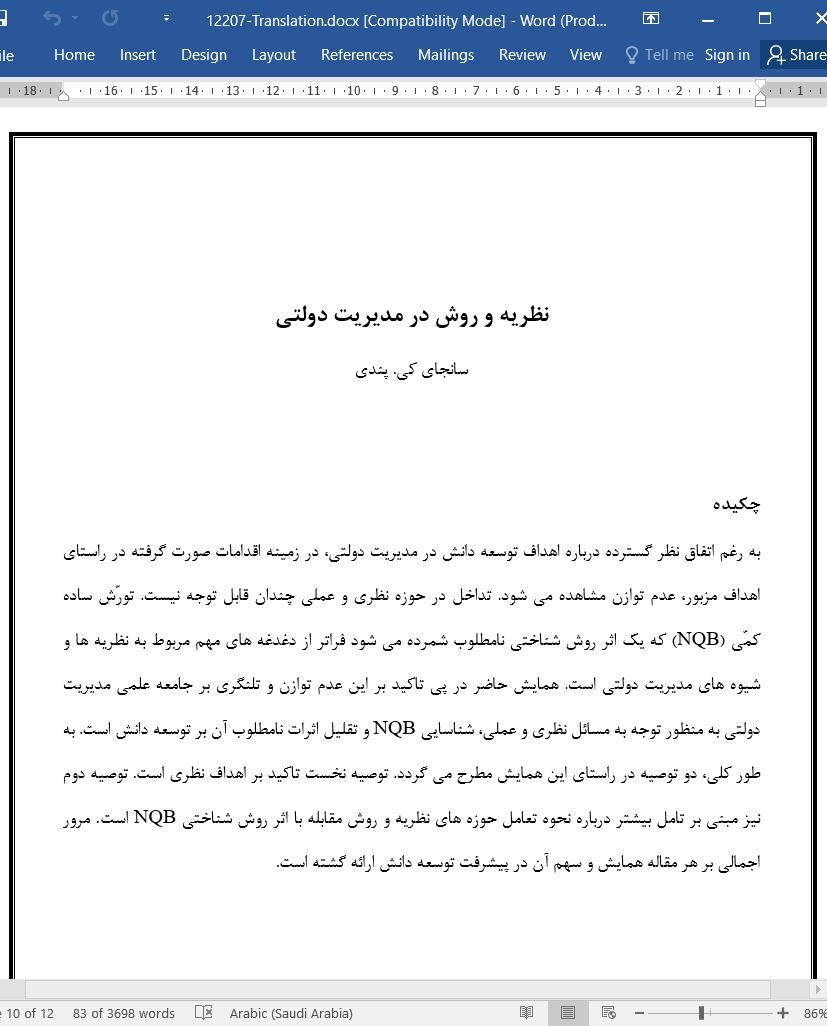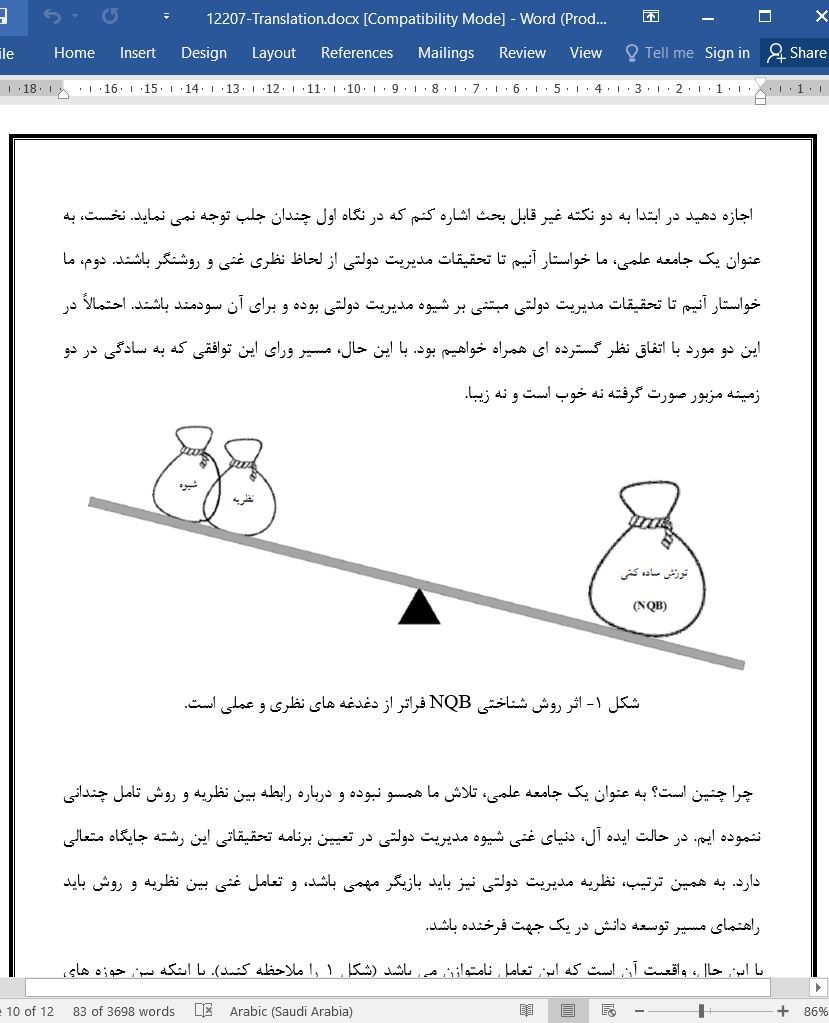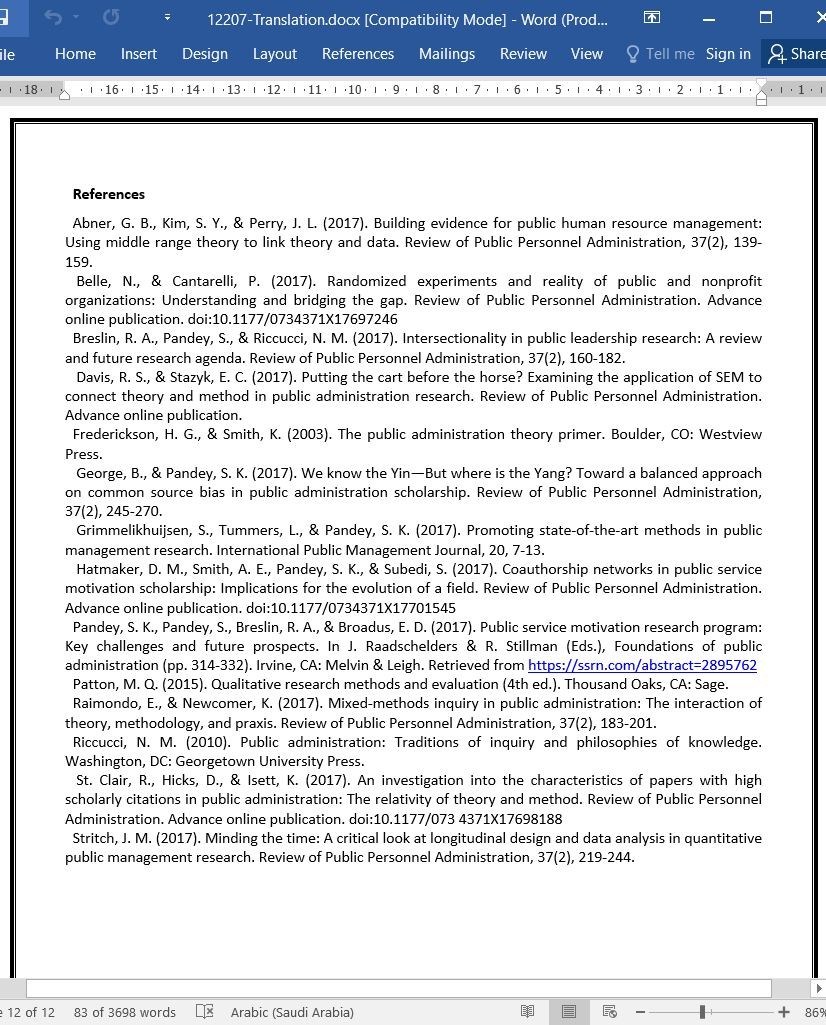
نظریه و روش در مدیریت دولتی
چکیده
به رغم اتفاق نظر گسترده درباره اهداف توسعه دانش در مدیریت دولتی، در زمینه اقدامات صورت گرفته در راستای اهداف مزبور، عدم توازن مشاهده می شود. تداخل در حوزه نظری و عملی چندان قابل توجه نیست. تورّش ساده کمّی (NQB) که یک اثر روش شناختی نامطلوب شمرده می شود فراتر از دغدغه های مهم مربوط به نظریه ها و شیوه های مدیریت دولتی است. همایش حاضر در پی تاکید بر این عدم توازن و تلنگری بر جامعه علمی مدیریت دولتی به منظور توجه به مسائل نظری و عملی، شناسایی NQB و تقلیل اثرات نامطلوب آن بر توسعه دانش است. به طور کلی، دو توصیه در راستای این همایش مطرح می گردد. توصیه نخست تاکید بر اهداف نظری است. توصیه دوم نیز مبنی بر تامل بیشتر درباره نحوه تعامل حوزه های نظریه و روش مقابله با اثر روش شناختی NQB است. مرور اجمالی بر هر مقاله همایش و سهم آن در پیشرفت توسعه دانش ارائه گشته است.
اجازه دهید در ابتدا به دو نکته غیر قابل بحث اشاره کنم که در نگاه اول چندان جلب توجه نمی نماید. نخست، به عنوان یک جامعه علمی، ما خواستار آنیم تا تحقیقات مدیریت دولتی از لحاظ نظری غنی و روشنگر باشند. دوم، ما خواستار آنیم تا تحقیقات مدیریت دولتی مبتنی بر شیوه مدیریت دولتی بوده و برای آن سودمند باشند. احتمالاً در این دو مورد با اتفاق نظر گسترده ای همراه خواهیم بود. با این حال، مسیر ورای این توافقی که به سادگی در دو زمینه مزبور صورت گرفته نه خوب است و نه زیبا.
نتیجه گیری
همایش حاضر سوالات مهمی را مطرح نموده و پیشنهادات سازنده ای را درباره نحوه بهبود تشکیلات توسعه دانش در مدیریت دولتی ارائه می نماید. نویسندگان باید به مقالات داوری شده توجه نشان داده و این تصور که هر مقاله به رشته خاصی اختصاص دارد غیرمنصفانه می باشد. اینجا نقطه ای است که کنترل خودکار "دست نامرئی" داوری همکار (یا هماهنگی یک دیدگاه خاص در چند مقاله داوری شده) نیازمند کمک بوده و امیدواریم که همایش حاضر این مساعدت را فراهم کند!
Abstract
Despite widespread agreement about goals of knowledge development in public administration, there is imbalance in efforts directed at these goals. The overlap between the domains of theory and practice is not substantial. Important concerns in public administration theory and practice are outweighed by naïve quantitative bias (NQB), an unfortunate methodological artifact. This symposium seeks to highlight this imbalance and to nudge the public administration scholarly community toward paying attention to theoretical and practical matters, recognizing NQB and mitigating its undesirable effects on knowledge development. Broadly speaking, two recommendations emerge from symposium contributions. The first recommendation emphasizes paying attention to theoretical goals. The second recommendation is to promote reflexivity about how the domains of theory and method interact to counter the methodological artifact of NQB. A brief overview of each article in the symposium and its contribution to advancing knowledge development is provided.
Let me begin by making two uncontroversial points that seem almost jejune at first blush. First, as a scholarly community, we want public administration research to be theoretically rich and insightful. Second, we want public administration research to be well grounded in and useful for public administration practice. We are likely to get widespread agreement on these two points. Yet, the road beyond easy agreement on these two points is neither well-paved nor pretty.
Conclusion
The symposium contributions raise significant questions and offer constructive suggestions on how we can improve the knowledge development enterprise in public administration. There is much that authors need to be responsive to in an individual peer-reviewed contribution, and therefore, it is unfair to hold every single paper accountable for the state of the discipline. This is where the auto-pilot of the “invisible hand” of peer-reviewing (or orchestration of a specific point of view through a few peer-reviewed articles) needs help, and we hope that the symposium contributions provide that help!
چکیده
اولویت بندی مسائل نظری
تامل در تعامل بین نظریه و روش
نتیجه گیری
منابع
Abstract
Prioritizing Theoretical Concerns
Promoting Reflexivity in Theory and Method Interaction
Conclusion
References
- اصل مقاله انگلیسی با فرمت ورد (word) با قابلیت ویرایش
- ترجمه فارسی مقاله با فرمت ورد (word) با قابلیت ویرایش، بدون آرم سایت ای ترجمه
- ترجمه فارسی مقاله با فرمت pdf، بدون آرم سایت ای ترجمه



